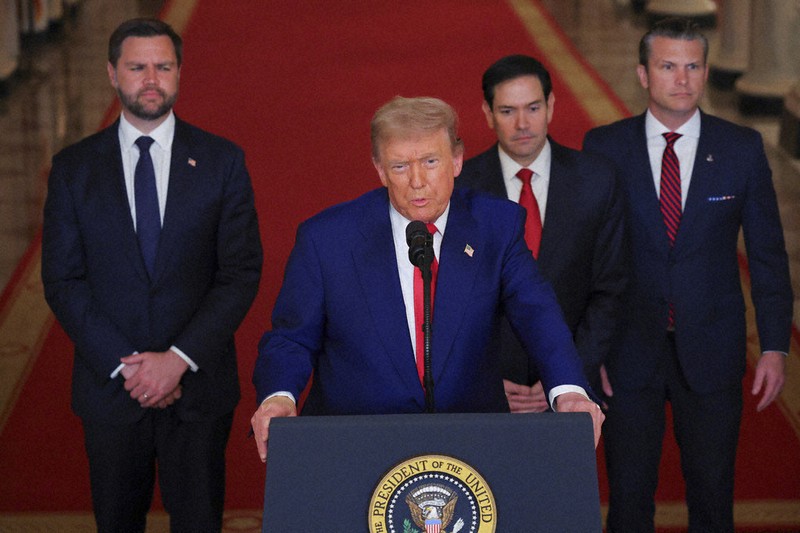Editorial: US attack on Iran facilities a high-handed use of force going against reason

The administration of U.S. President Donald Trump recently launched attacks on three nuclear facilities in Iran, saying its goal was to destroy Iran's nuclear development capabilities and prevent a nuclear threat. Intervention by the U.S. military could lead to the spread of war in the Middle East, deepening global chaos. It is imperative to put an end to the conflict as soon as possible.
Several large "bunker buster" bombs designed to penetrate deep in the ground before exploding were used to strike the underground Fordo nuclear facility in central Iran.
In an announcement, Trump said the strikes "completely and totally obliterated" Iran's key nuclear enrichment facilities, and threatened continued attacks unless Iran makes peace with Israel. He also hinted at the possibility of a regime change in Iran.
Two days before the strikes, Trump had said he would decide whether or not to attack Iran within two weeks, leaving room for negotiations with the country, but went ahead with military action without waiting for direct talks.
Israel had requested the U.S. military's attack on Iran's nuclear facilities. In a video message, Israeli Prime Minister Benjamin Netanyahu praised Trump's "bold decision" to target the facilities, and stated that in its action, "America has been truly unsurpassed."
Fostering further confusion
The strikes drew a backlash from Iran, which criticized them as "outrageous." Iran downplayed the damage as being limited, and revealed its intention to continue nuclear development.
Admittedly, while Iran claims that its nuclear development is for "peaceful use," it has taken actions raising suspicions of nuclear weapons development. It is said to be producing highly enriched uranium close to weapons-grade levels. The facility at Fordo is built deep underground, protected by bedrock, and is believed to house highly enriched uranium. However, this does not justify the U.S. attacks.
Under international law, the use of force against another country is only permitted in cases of self-defense or if there is a United Nations Security Council resolution. The exercise of self-defense is premised on either retaliating after being attacked or facing an imminent threat, but neither applies here.
In the first place, Israel's preemptive strike against Iran violates international law. The U.S. military's attack is tantamount to complicity in this illegal act.
Trump has stressed that Iran's nuclear development poses a serious threat to international society. If that's indeed the case, then the logical thing for him to do would be to go to the United Nations Security Council and present evidence of it.
Trump's actions, completely disregarding rules and procedures to attack another country's territory at will, go against reason and cannot be overlooked.
Attacks on nuclear facilities carry the risk of radioactive leaks and are ethically unacceptable.
Previously during the Iraq War, which was initiated under the pretext of removing weapons of mass destruction, the Saddam Hussein regime was toppled, yet no evidence of such weapons was found.
Even within the ruling Republican Party, there have arisen claims that not consulting Congress on the use of force is unconstitutional. It is only natural that U.N. Secretary-General Antonio Guterres stated he was "gravely alarmed" by the use of force by the United States against Iran and warned that it poses a "direct threat to international peace and security."
The concern is that the entire Middle East could be plunged into war, severely impacting the world.
Diplomacy as a means of resolution
Iran has indicated it could retaliate with strikes against U.S. military bases in the Middle East. There is a risk that pro-Iranian armed groups rooted across the Middle East could join the conflict. If that happens, Western nations and Israel's confrontation with Arab and Islamic countries will intensify. Russia and China are likely to harden their stance against the West.
Iran has suggested that it could close the Strait of Hormuz leading to the Persian Gulf, a vital artery for oil transportation. The surge in oil prices would severely impact a world already suffering from inflation.
The wars in Europe and the Middle East are likely to increase distrust among emerging and developing countries collectively known as the Global South, which are already bearing the economic brunt of the conflicts.
Japan's position is also under scrutiny. Prime Minister Shigeru Ishiba condemned Israel's attack on Iran as "absolutely unacceptable," but regarding the U.S. attack, only stated that "early stabilization is of utmost importance."
In Asia, North Korea is manufacturing nuclear warheads and deploying numerous ballistic missiles capable of carrying them. The threat level is more severe than that of Iran.
The U.S. previously considered attacking North Korean nuclear facilities but refrained from doing so due to the risk of Asia plunging into chaos.
As an ally, Japan must not overlook the United States' unilateral use of military force. It should collaborate with Europe to encourage restraint.
Solutions by force create future sources of trouble, leading to repeated tragedies. Only a diplomatic resolution can fundamentally address the root issues.
Posting Komentar untuk "Editorial: US attack on Iran facilities a high-handed use of force going against reason"
Posting Komentar